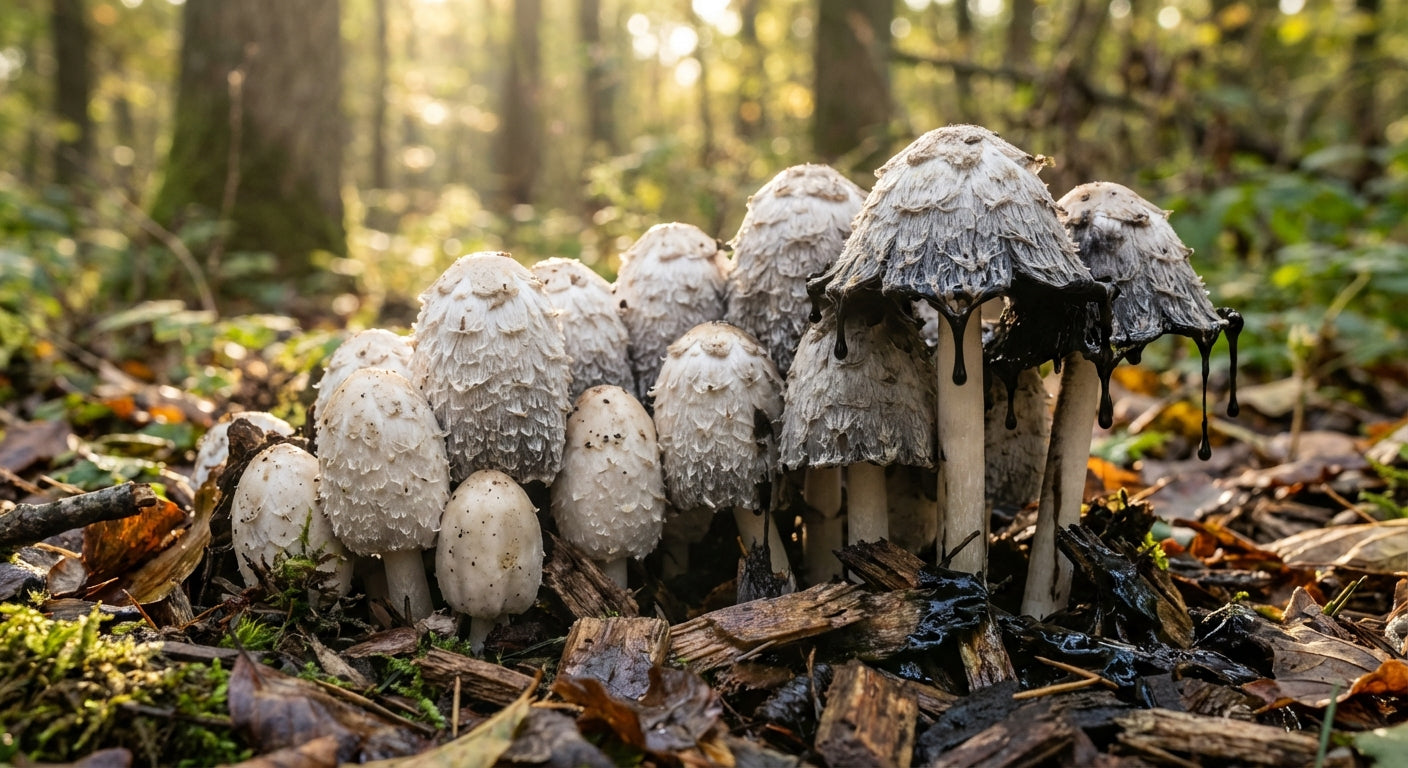Introduction
Turkey Tail mushroom (Trametes versicolor) has gained significant attention in the natural health community for its impressive array of potential benefits. Among the many questions surrounding this fascinating fungi is its relationship with hormonal health, particularly estrogen. As more people turn to natural supplements for supporting their wellbeing, understanding how Turkey Tail mushroom interacts with hormones like estrogen becomes increasingly important.
In this comprehensive guide, we'll explore the scientific research behind Turkey Tail mushroom's effects on estrogen levels, how it might benefit hormonal health, and what you should know before incorporating it into your wellness routine. Whether you're dealing with hormonal imbalances or simply curious about this medicinal mushroom's properties, this article will provide evidence-based insights to help you make informed decisions.
Understanding Turkey Tail Mushroom
What Is Turkey Tail Mushroom?
Turkey Tail mushroom (Trametes versicolor, formerly known as Coriolus versicolor) is a common polypore fungus found growing on dead logs, stumps, and fallen trees throughout forests worldwide. Its name comes from its distinctive appearance, with concentric rings of varying colors that resemble a wild turkey's tail. This mushroom has been used in traditional Chinese medicine for centuries, where it's known as Yun Zhi.
Key Bioactive Compounds
The therapeutic potential of Turkey Tail mushroom comes from its rich composition of bioactive compounds, including:
- Polysaccharide-K (PSK): Also known as krestin, this compound has been extensively studied for its immune-modulating properties
- Polysaccharide Peptide (PSP): Another important component with potential immunomodulatory effects
- Beta-glucans: Complex sugars that support immune function
- Phenolic compounds: Including flavonoids with antioxidant properties
- Triterpenoids: Compounds with various biological activities
These components work synergistically to provide Turkey Tail's potential health benefits, including possible effects on hormonal health.
Turkey Tail Mushroom and Estrogen: The Connection
Does Turkey Tail Affect Estrogen Levels?
One of the most common questions about Turkey Tail mushroom relates to its effects on estrogen. Based on current scientific research, Turkey Tail mushroom does not appear to directly increase estrogen production or act as a phytoestrogen (plant compound that mimics estrogen in the body) in the way that certain herbs like soy or red clover do.
Instead, Turkey Tail's relationship with hormonal health appears to be more indirect, potentially helping to:
- Support the body's natural detoxification pathways that process hormones
- Provide antioxidant support that may protect hormone-producing glands
- Modulate immune function, which can influence hormonal balance
Research on Turkey Tail and Hormonal Health
While research specifically examining Turkey Tail's effects on estrogen is limited, several studies have investigated related aspects of how this mushroom might influence hormonal health:
-
Liver support: The liver plays a crucial role in hormone metabolism, including the processing and elimination of excess estrogen. Turkey Tail's potential liver-supporting properties may indirectly help maintain healthy estrogen balance.
-
Antioxidant activity: Research has shown that compounds in Turkey Tail have antioxidant properties, which may help protect tissues, including those involved in hormone production and regulation, from oxidative damage.
-
Immune modulation: The immune system and hormonal system are interconnected. Turkey Tail's well-documented immune-modulating effects may indirectly support hormonal balance.

Potential Benefits for Hormonal Health
Supporting Women's Health
While not directly estrogen-related, Turkey Tail mushroom has shown potential benefits for aspects of women's health that may be relevant to hormonal wellbeing:
Breast Health Support
Turkey Tail has been extensively studied in relation to breast health. In Japan, a specific extract of Turkey Tail called PSK has been used as a complementary therapy for breast health support. These effects appear to be related to immune modulation rather than direct hormonal effects.
Research published in the journal ISRN Oncology found that Turkey Tail mushroom extracts supported immune function in women concerned about breast health. While this doesn't directly indicate effects on estrogen, it suggests potential benefits for overall breast tissue health.
Reproductive System Health
The antioxidant and immune-supporting properties of Turkey Tail may offer general support for reproductive system health. By reducing oxidative stress and supporting immune function, Turkey Tail might help maintain the health of reproductive tissues that are responsive to hormones like estrogen.
Balancing Properties
Rather than directly increasing or decreasing estrogen, Turkey Tail appears to have adaptogenic-like qualities that may help support overall balance in the body's systems:
-
Gut health support: Emerging research suggests a connection between gut health and hormonal balance. Turkey Tail contains prebiotic fibers that may support a healthy gut microbiome, potentially influencing hormone metabolism indirectly.
-
Anti-inflammatory effects: Chronic inflammation can disrupt hormonal balance. The anti-inflammatory properties of Turkey Tail may help mitigate this effect, supporting healthier hormone function.
Scientific Research on Turkey Tail Mushroom
Clinical Studies and Research Findings
While direct studies on Turkey Tail and estrogen are limited, numerous studies have examined other aspects of this mushroom's health effects:
Immune System Research
A review published in the journal Integrative Cancer Therapies examined multiple studies on Turkey Tail's immune-modulating properties. These properties may indirectly influence hormonal health by supporting overall immune balance.
Antioxidant Research
Research published in the International Journal of Medicinal Mushrooms found that Turkey Tail extracts had significant antioxidant activity, potentially protecting various tissues, including those involved in hormone production and regulation.
Gut Microbiome Studies
A study published in BMC Complementary Medicine and Therapies found that Turkey Tail mushroom supported beneficial gut bacteria. The gut microbiome plays a role in estrogen metabolism through what's known as the "estrobolome" – the collection of microbes capable of metabolizing estrogens.
Limitations of Current Research
It's important to acknowledge that research specifically examining Turkey Tail's effects on estrogen levels is still emerging. Most studies have focused on its immune-modulating and antioxidant properties rather than direct hormonal effects. More research is needed to fully understand how Turkey Tail might influence estrogen metabolism and hormonal health.
How to Use Turkey Tail Mushroom
Forms and Preparations
Turkey Tail mushroom is available in several forms:
- Capsules and tablets: Convenient for consistent dosing
- Powders: Can be added to smoothies, coffee, or tea
- Tinctures: Liquid extracts that can be taken directly or added to beverages
- Teas: Dried mushroom pieces steeped in hot water
- Whole dried mushrooms: Can be used to make teas or broths
Recommended Dosage
Dosage recommendations for Turkey Tail can vary based on the specific preparation and individual needs:
- Capsules/tablets: Typically 500-2000 mg daily
- Powder: Usually 1-2 teaspoons (2-4 grams) daily
- Tincture: 30-60 drops, 1-3 times daily
It's always best to follow the manufacturer's recommendations or consult with a healthcare professional for personalized dosage guidance.
Best Practices for Consumption
For optimal results when using Turkey Tail mushroom:
- Start with a lower dose: Begin with a smaller amount and gradually increase to assess tolerance
- Be consistent: Regular use over time may provide better results than occasional consumption
- Consider hot water extraction: Many of the beneficial compounds in Turkey Tail are more bioavailable when the mushroom has been extracted with hot water
- Look for dual-extracted products: These provide both water-soluble and alcohol-soluble compounds
- Check for quality: Choose products from reputable manufacturers that test for purity and potency

Safety Considerations
Potential Side Effects
Turkey Tail mushroom is generally considered safe for most people when used appropriately. However, some individuals may experience:
- Digestive discomfort: Including gas, bloating, or changes in bowel movements, especially when first starting supplementation
- Taste/sensory reactions: Some people find the taste of Turkey Tail preparations unpleasant
- Allergic reactions: Though rare, allergic responses to mushrooms are possible
Drug Interactions
While Turkey Tail is generally considered safe, it may interact with certain medications:
- Immunosuppressants: Due to its immune-stimulating properties, Turkey Tail might theoretically counteract immunosuppressive drugs
- Blood-thinning medications: Some mushrooms may have mild blood-thinning effects, potentially enhancing the effects of anticoagulant medications
- Diabetes medications: Turkey Tail might affect blood sugar levels, potentially requiring adjustment of diabetes medications
Who Should Avoid Turkey Tail Mushroom
Certain individuals should exercise caution or avoid Turkey Tail mushroom:
- Pregnant or breastfeeding women: Due to limited safety data
- People with mushroom allergies: Those with known allergies to mushrooms should avoid Turkey Tail
- Individuals with autoimmune conditions: Should consult a healthcare provider before use
- People scheduled for surgery: Should discontinue use at least two weeks before surgical procedures
- Individuals with hormone-sensitive conditions: Should consult healthcare providers about potential effects
Turkey Tail vs. Other Medicinal Mushrooms for Hormonal Health
Comparing Popular Medicinal Mushrooms
While Turkey Tail has potential indirect benefits for hormonal health, other medicinal mushrooms have been more specifically studied for their effects on hormonal balance:
Reishi (Ganoderma lucidum)
Reishi contains compounds called triterpenes that some research suggests may help modulate hormone production. Some studies indicate it might help balance estrogen levels by inhibiting the enzyme aromatase, which converts testosterone to estrogen.
Chaga (Inonotus obliquus)
Chaga mushroom contains betulinic acid and other compounds that may support adrenal function and potentially help with stress-related hormonal imbalances.
Maitake (Grifola frondosa)
Maitake has been studied for its potential to help regulate insulin and glucose metabolism, which can indirectly support hormonal balance, particularly in conditions like PCOS (Polycystic Ovary Syndrome).
When to Choose Turkey Tail
Turkey Tail may be particularly appropriate for those seeking:
- General immune support alongside hormonal health benefits
- Antioxidant protection for hormone-producing tissues
- Gut health support that may indirectly benefit hormone metabolism
- A well-researched mushroom with a strong safety profile
Frequently Asked Questions About Turkey Tail and Hormonal Health
Does Turkey Tail Increase Estrogen?
Based on current research, Turkey Tail mushroom does not appear to directly increase estrogen levels in the body. It is not known to contain significant phytoestrogens or to stimulate estrogen production. Its benefits for hormonal health likely come through indirect mechanisms such as supporting liver function, providing antioxidant protection, and modulating immune function.
Can Turkey Tail Help with Menopausal Symptoms?
While some women report improvements in menopausal symptoms when taking Turkey Tail, there is limited scientific research specifically studying this application. Turkey Tail's potential support for overall well-being, immune function, and inflammation reduction might indirectly help some individuals managing menopausal transitions, but it is not primarily used for this purpose.
Is Turkey Tail Safe for People with Hormone-Sensitive Conditions?
Individuals with hormone-sensitive conditions, such as certain types of breast, uterine, or ovarian concerns, should consult with their healthcare providers before using Turkey Tail or any supplement. While current research doesn't suggest that Turkey Tail directly affects estrogen levels, caution is warranted until more specific studies are available.
How Long Does It Take to See Benefits from Turkey Tail?
The timeframe for experiencing benefits from Turkey Tail mushroom can vary significantly depending on individual factors, the specific benefit being sought, and the quality and dosage of the supplement. Some immune effects may begin within weeks, while other potential benefits might take longer to manifest. Consistency in use is typically important for optimal results.
Conclusion
Turkey Tail mushroom offers a fascinating array of potential health benefits, though its specific effects on estrogen appear to be indirect rather than direct. While not a primary herb for hormonal balance, its impressive immune-modulating, antioxidant, and gut-supporting properties may provide complementary support for overall hormonal health.
As with any supplement, it's important to approach Turkey Tail with realistic expectations and to consult with healthcare providers, especially for those with existing health conditions or those taking medications. The growing body of research on medicinal mushrooms continues to reveal new insights into their therapeutic potential, including possible benefits for hormonal well-being.
Whether you're specifically interested in supporting estrogen balance or seeking broader health benefits, Turkey Tail mushroom represents a promising natural option with a long history of traditional use and an expanding foundation of scientific support. As research continues to evolve, we'll likely gain even more clarity about how this remarkable mushroom can contribute to hormonal health and overall wellness.
















Share:
Are Turkey Tail Mushrooms Safe and Edible for Humans?
How to Prepare Turkey Tail Mushrooms: A Simple Step-by-Step Guide